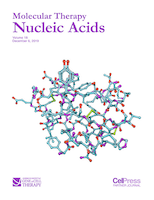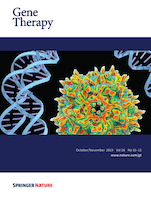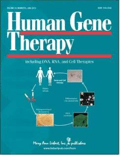
Molecular Therapy Methods & Clinical Development
Scope & Guideline
Empowering collaboration in gene and cell therapy.
Introduction
Aims and Scopes
- Gene Therapy Techniques:
The journal emphasizes the development and refinement of gene therapy methodologies, including viral vector design, delivery systems, and genome editing technologies. - Cell Therapy Innovations:
It explores advancements in cell therapies, particularly those involving engineered immune cells, stem cells, and their applications in treating various diseases. - Clinical Development and Trials:
The journal covers the translation of molecular therapies into clinical settings, discussing trial designs, outcomes, and regulatory considerations. - Analytical Techniques:
There is a strong focus on analytical methods for characterizing therapeutic vectors, assessing their efficacy, and understanding their interactions within biological systems. - Safety and Immunogenicity:
Research on the safety profiles of gene and cell therapies, including immune responses and long-term effects, is a critical area of investigation.
Trending and Emerging
- CRISPR and Genome Editing:
There is a significant increase in publications focusing on CRISPR technology and innovative genome editing strategies, highlighting its potential for precise therapeutic applications. - Personalized Medicine Approaches:
Emerging research emphasizes personalized gene therapies tailored to individual genetic profiles, which is crucial for enhancing efficacy and safety in clinical applications. - Novel Vector Development:
The development of new viral vectors and modifications to existing ones, such as engineered AAV capsids for improved tropism, is gaining traction as researchers seek to enhance delivery efficiency. - Combination Therapies:
The trend towards exploring combination therapies that integrate gene therapy with other modalities, such as immune checkpoint inhibitors or small molecule drugs, is becoming more prevalent. - Long-term Safety and Efficacy Studies:
There is an increasing emphasis on long-term studies assessing the safety and durability of therapeutic effects, reflecting a growing concern for the chronic administration of gene therapies.
Declining or Waning
- Traditional Viral Vectors:
Research on conventional viral vectors, such as older AAV serotypes, appears to be declining as newer, more effective vector technologies are developed and adopted. - Non-viral Gene Delivery Systems:
Interest in non-viral methods for gene delivery, while still relevant, has decreased in favor of advancements in viral vector technologies that demonstrate higher efficiency and specificity. - Basic Mechanistic Studies:
There seems to be a waning focus on basic mechanistic studies of gene delivery processes, as the field shifts towards more applied research and clinical outcomes. - Animal Models in Preclinical Studies:
The reliance on traditional animal models for preclinical testing is being challenged by the development of more sophisticated in vitro systems and humanized models. - Regulatory Frameworks:
Discussions around regulatory frameworks for gene therapy appear less frequent as the field matures and more established guidelines are adopted.
Similar Journals

Molecular and Cellular Pediatrics
Empowering researchers to shape the future of pediatrics.Molecular and Cellular Pediatrics is a leading journal published by SPRINGERNATURE, dedicated to advancing knowledge in the fields of pediatrics, perinatology, and child health through innovative molecular and cellular research. Since its transition to Open Access in 2014, the journal has facilitated widespread dissemination of critical findings, making it accessible to a global audience of researchers, healthcare professionals, and students. The journal's scope encompasses a range of topics that explore the intersection of molecular biology and pediatric medicine, aiming to bridge gaps in our understanding of child health and development. With Scopus rankings placing it at the 48th percentile in pediatrics and a significant focus on cutting-edge research, Molecular and Cellular Pediatrics plays an essential role in shaping future research and clinical practices in the field. Its commitment to academic rigor and accessibility makes it a vital resource for those dedicated to improving pediatric health outcomes.

Molecular Therapy Nucleic Acids
Advancing nucleic acid innovations for a healthier tomorrow.Molecular Therapy Nucleic Acids is a premier open-access journal published by CELL PRESS, dedicated to advancing the field of molecular medicine through the innovative application of nucleic acid-based therapies. Since its inception in 2012, this journal has become an essential resource for researchers and professionals in drug discovery and molecular medicine, reflected in its status as a Q1 journal in both categories for 2023. With a notable impact factor and high rankings in Scopus, including #8 out of 157 in Drug Discovery and #16 out of 178 in Molecular Medicine, it serves to disseminate groundbreaking research and foster collaborations among scientists worldwide. The journal's comprehensive scope encompasses a wide variety of topics, including gene therapy, RNA interference, and CRISPR technology, ensuring that it remains at the forefront of scientific excellence. With open access availability, Molecular Therapy Nucleic Acids actively promotes the widespread dissemination of knowledge, making its crucial insights accessible to students, researchers, and industry professionals alike.

GENE THERAPY
Catalyzing Change in Genetic Disorder TreatmentsGENE THERAPY, published by SpringerNature, is a prestigious academic journal at the forefront of research in the fields of genetics, molecular biology, and molecular medicine. Since its inception in 1994, this journal has evolved into a vital resource for scholars, practitioners, and students, providing cutting-edge insights into gene therapy techniques and innovations. With an impressive impact factor reflecting its significant influence— ranking in the Q1 quartile across multiple categories in 2023—GENE THERAPY offers rigorous peer-reviewed articles that address both basic and applied aspects of gene therapy. The journal is recognized for its role in promoting advancements in therapeutic strategies, thus enhancing understanding of genetic disorders and treatment efficacy. Researchers will find this journal invaluable for publishing their findings, staying updated on the latest breakthroughs, and fostering interdisciplinary collaborations. Engage with the latest in gene therapy by accessing this influential platform, and contribute to a field that holds the potential to transform healthcare outcomes worldwide.

Stem Cell Research & Therapy
Unlocking the Potential of Stem Cells for TomorrowStem Cell Research & Therapy is an esteemed international journal published by BMC, specializing in the rapidly advancing fields of stem cell research and regenerative therapies. Since its inception in 2010, the journal has embraced an Open Access model, ensuring that vital research is readily accessible to a global audience. With a significant impact in the scientific community, it holds Q1 quartile rankings in prestigious categories such as Biochemistry, Genetics and Molecular Biology, Cell Biology, and Molecular Medicine, highlighting its critical role in promoting groundbreaking research. The journal’s high Scopus rankings—placing it in the top echelons of its fields—reflect its commitment to publishing high-quality, peer-reviewed studies that advance our understanding of stem cell biology and therapeutic applications. Aimed at researchers, healthcare professionals, and students alike, Stem Cell Research & Therapy is an indispensable resource for those dedicated to the exploration and innovation within this transformative area of science.

Cell Stem Cell
Fostering Global Collaboration in Cutting-Edge Stem Cell DiscoveriesCell Stem Cell, published by CELL PRESS, is a premier journal at the forefront of cellular biology, genetics, and molecular medicine. With an esteemed impact factor and recognized as a Q1 journal in multiple categories including Cell Biology, Genetics, and Molecular Medicine, it offers researchers, professionals, and students rigorous, peer-reviewed articles that shape the future of stem cell research and regenerative medicine. Located in Cambridge, MA, this journal has become an invaluable resource since its inception in 2007 and is committed to disseminating groundbreaking findings that drive innovation and understanding in these critical fields. By consistently ranking within the top percentile of its categories in Scopus, Cell Stem Cell remains an essential platform for scholarly communication, fostering collaboration among leading scientists worldwide. Although the journal does not currently offer open access options, its comprehensive insights are pivotal for anyone engaged in the study of stem cells and their applications.

JOURNAL OF GENE MEDICINE
Advancing the Frontiers of Gene TherapyThe Journal of Gene Medicine, published by Wiley, stands as a pivotal resource in the field of gene therapy and molecular medicine, with a rich history of dissemination of impactful research since its inception in 1998. With an ISSN of 1099-498X and an E-ISSN of 1521-2254, this esteemed journal plays a crucial role in advancing our understanding of genetics and drug discovery, reflected in its impressive 2023 Scopus rankings where it holds a Q2 classification in Drug Discovery and Q3 in several genetics-related categories. The journal aims to facilitate the exchange of high-quality research findings that bridge the gap between laboratory and clinical applications, making it an essential platform for researchers, academics, and healthcare professionals committed to the forefront of genetic innovation. Although it does not currently offer open access options, its reputation for rigorous peer review ensures that all published work meets the highest academic standards, providing a reliable reference for scientific inquiry in the United States and beyond. As the field rapidly evolves, the Journal of Gene Medicine remains at the helm, guiding future discoveries with its influential publications and comprehensive insights.

HUMAN GENE THERAPY
Unveiling Breakthroughs in Molecular MedicineHuman Gene Therapy, an esteemed journal published by Mary Ann Liebert, Inc., is at the forefront of the rapidly evolving fields of genetics, molecular biology, and molecular medicine. With a significant impact in its domain, it is categorized in the Q2 quartile across multiple disciplines, reflecting its commitment to disseminating high-quality, impactful research. Established in 1990, the journal has continuously provided a vital platform for scientists and practitioners to explore groundbreaking developments in gene therapy, genetic engineering, and related technologies. With a focus on peer-reviewed articles that foster advancements in therapeutic applications, Human Gene Therapy serves not only as a comprehensive resource for academia but also as an essential reference for professionals engaged in genetic research and clinical practice. Although currently not open access, the journal remains a crucial source of knowledge, driving innovation and collaboration within the gene therapy community.

CANCER GENE THERAPY
Transforming Cancer Care Through Genetic InsightsCancer Gene Therapy, published by SpringerNature, stands at the forefront of research in the fields of cancer research, molecular biology, and molecular medicine. With a robust impact factor reflecting its significant influence—ranking in the Q2 category for cancer research and Q1 for both molecular biology and molecular medicine—it serves as an essential resource for scholars and practitioners alike. Since its inception in 1994, the journal has dedicated itself to advancing the understanding and therapeutic application of genetic innovations in oncology. Notably, it holds distinguished Scopus ranks, placing it among the top tier journals in its categories, underscoring its importance to the scientific community. While open access options are not available, the compelling research published here offers invaluable insights into the latest advancements and strategies in cancer therapy. Engaging with *Cancer Gene Therapy* not only keeps professionals informed but also inspires future innovations in the quest for effective cancer treatments.

CELL TRANSPLANTATION
Fostering breakthroughs in biomedical engineering.CELL TRANSPLANTATION is a premier multidisciplinary journal dedicated to advancing the field of regenerative medicine and transplantation, published by SAGE PUBLICATIONS INC. Since its initiation in 1992 and embracing an open-access model since 2017, the journal aims to disseminate high-quality research that covers both clinical and experimental studies on cell and tissue transplantation. With a notable impact reflected in its 2023 Q2 ranking in Biomedical Engineering and significant standings in Cell Biology and Transplantation, CELL TRANSPLANTATION serves as a vital resource for researchers, practitioners, and students alike. The journal's commitment to fostering innovation is evident in its diverse contributions that address the complexities of tissue engineering, immunology, and regenerative therapies, inviting readers to engage with cutting-edge science that is poised to transform medical practices and improve patient outcomes. The journal's insightful articles and research findings make it a crucial platform for knowledge exchange within the vibrant scientific community.

JOURNAL OF OCULAR PHARMACOLOGY AND THERAPEUTICS
Elevating ophthalmic therapies for a brighter future.JOURNAL OF OCULAR PHARMACOLOGY AND THERAPEUTICS, published by Mary Ann Liebert, Inc, stands at the forefront of research in the realms of ophthalmology and pharmacology. Established in 1985 and converging until 2024, this esteemed journal is dedicated to advancing the understanding of ocular pharmacology, drug therapies, and therapeutic approaches in the treatment of eye diseases. With an impressive impact factor and categorized in the Q2 quartile for both Ophthalmology and Medical Pharmacology, it showcases pivotal research in the field, reflecting its rank of #31 among 137 in Ophthalmology and #109 among 272 in Medical Pharmacology per Scopus metrics. Although it follows a subscription-based model, the journal provides critical insights and empirical studies that foster innovation and collaboration for researchers, professionals, and students alike in the pursuit of improving ocular health.